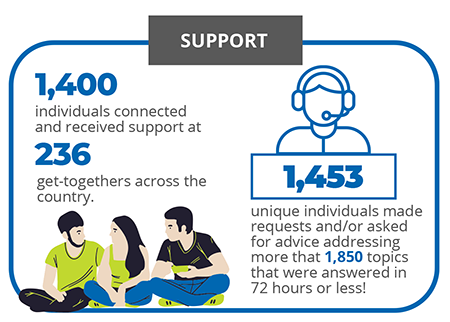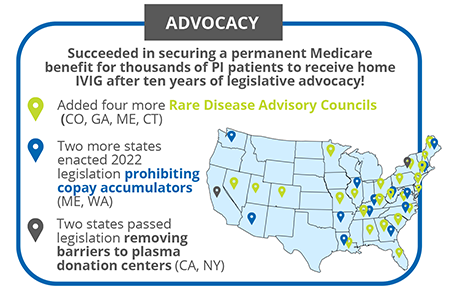
-
Understanding primary immunodeficiency (PI)

Understanding PI
The more you understand about primary immunodeficiency (PI), the better you can live with the disease or support others in your life with PI. Learn more about PI, including the various diagnoses and treatment options.
-
Living with PI
-
Addressing mental health
-
Explaining your diagnosis
- General care
- Get support
- For parents and guardians
-
Managing workplace issues
- Navigating insurance
-
Traveling safely

Living with PI
Living with primary immunodeficiency (PI) can be challenging, but you’re not alone—many people with PI lead full and active lives. With the right support and resources, you can, too.
-
Addressing mental health
-
Get involved

Get involved
Be a hero for those with PI. Change lives by promoting primary immunodeficiency (PI) awareness and taking action in your community through advocacy, donating, volunteering, or fundraising.
-
Advancing research and clinical care
-
Research Grant Program
-
Consulting immunologist
-
Diagnosing PI
-
Getting prior authorization
-
Clinician education
-
Survey research
-
Participating in clinical trials

Advancing research and clinical care
Whether you’re a clinician, researcher, or an individual with primary immunodeficiency (PI), IDF has resources to help you advance the field. Get details on surveys, grants, and clinical trials.
-
Research Grant Program
“Our numbers tell the story” declares the recently released 2022 IDF Community Impact flyer—and by all counts, that story involves thousands of people in the primary immunodeficiency (PI) community and beyond. IDF continued to lead the way in supporting PI education, advocacy, and research thanks to more than 500 volunteers and over $7 million in donations, sponsorships, and grants in 2022.
Providing education and support

2022 IDF Community Impact flyer.
Education and support for those living with PI and their caretakers is a fundamental part of IDF’s mission. Ask IDF provided one-on-one assistance to 1,453 individuals on topics like health insurance, finding knowledgeable physicians, and day-to-day management of their condition. And almost as many people connected through IDF’s support groups.
During 2022, IDF distributed more than 100,000 free copies of educational publications and launched the fourth edition of the IDF School Guide for Students with Primary Immunodeficiency© and the “I Am Immunocompromised” card. More than 6,300 PI community members attended 139 live educational sessions on topics ranging from COVID-19 to CVID and fatigue. These sessions garnered even more views as videos on IDF’s YouTube account.
In addition to educating those with PI and their caretakers, IDF also works to educate medical professionals, and in 2022, IDF launched a special effort to reach clinicians across medical specialties. Staff exhibited at seven medical conferences outside the field of immunology to share resources and raise awareness with healthcare professionals who may not be familiar with PI or IDF. This initiative will continue in 2023. By spreading awareness among providers in a variety of specialties who may unknowingly see patients with undiagnosed PI, IDF hopes to reduce the time to diagnosis.
Advocating for those with PI
Perhaps the biggest policy win for the PI community in 2022 was the last-minute inclusion of a permanent Medicare benefit covering the medication, services, and supplies needed for home intravenous immunoglobulin (IVIG) treatment in the end-of-year federal omnibus legislation. After working with legislators and the Centers for Medicare and Medicaid Services (CMS) for almost a decade, IDF secured this benefit for all Medicare beneficiaries with PI starting January 1, 2024. In the meantime, the Medicare Home IVIG Demonstration Project (demo) will continue to provide coverage for home IVIG to project enrollees through December 31, 2023. A recent FAQ answers questions about the demo and enrollment in light of the new permanent benefit.

2022 IDF Community Impact flyer.
IDF saw movement on other policy issues affecting individuals with PI as well, including the passage of legislation banning copay accumulators in two states and the establishment of Rare Disease Advisory Councils (RDACs) in four states. Two states also aligned their regulations on plasma donation centers with federal regulations. This policy change will increase the number of plasma donation centers in those states, ultimately increasing the supply of plasma needed to manufacture immunoglobulin.
Funding research and health equity
The immune system is an incredibly complex network of organs, cells, proteins, and small molecules. Research on how PI leads to clinical symptoms and how to treat these disorders requires ongoing investment. At the same time, understanding barriers to equitable care is key for ensuring cutting-edge research reaches all people affected by PI. To further research and its equitable application, IDF awarded four research grants and three white paper challenge awards totaling more than $170,000 in 2022.
In 2023, IDF will conduct its fifth national patient survey to collect data on diagnosis, treatment, and life with PI. This important data will inform IDF’s educational programs and advocacy efforts.
Topics
Related resources
Sign up for updates from IDF
Receive news and helpful resources to your cell phone or inbox. You can change or cancel your subscription at any time.





The Immune Deficiency Foundation improves the diagnosis, treatment, and quality of life for every person affected by primary immunodeficiency.
We foster a community that is connected, engaged, and empowered through advocacy, education, and research.
Combined Charity Campaign | CFC# 66309




